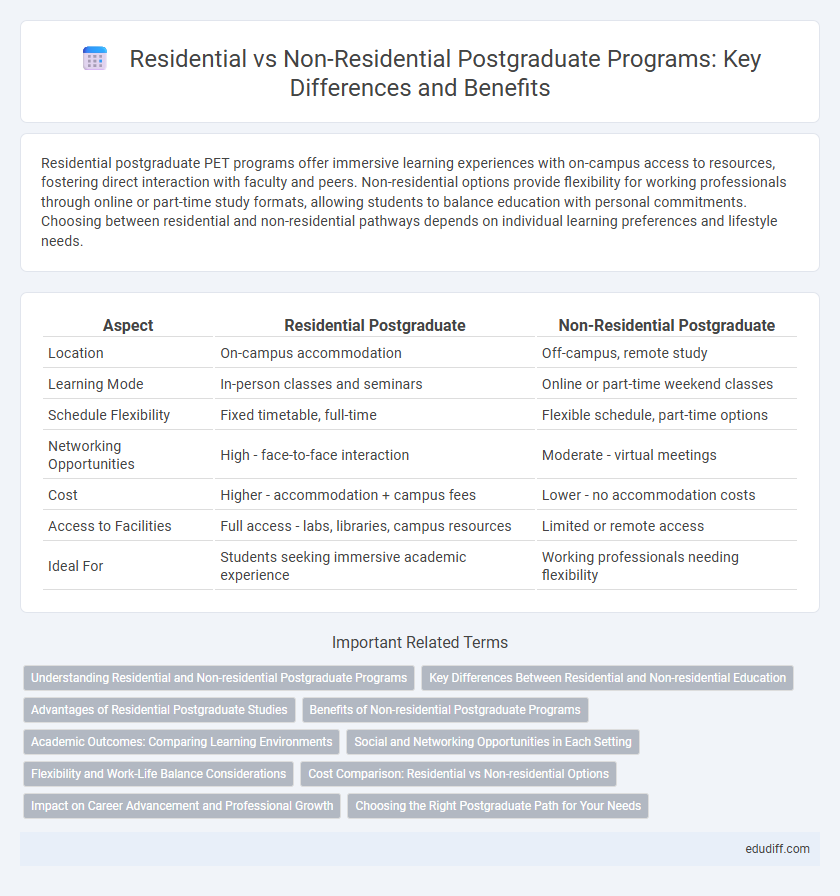Residential postgraduate PET programs offer immersive learning experiences with on-campus access to resources, fostering direct interaction with faculty and peers. Non-residential options provide flexibility for working professionals through online or part-time study formats, allowing students to balance education with personal commitments. Choosing between residential and non-residential pathways depends on individual learning preferences and lifestyle needs.
Table of Comparison
| Aspect | Residential Postgraduate | Non-Residential Postgraduate |
|---|---|---|
| Location | On-campus accommodation | Off-campus, remote study |
| Learning Mode | In-person classes and seminars | Online or part-time weekend classes |
| Schedule Flexibility | Fixed timetable, full-time | Flexible schedule, part-time options |
| Networking Opportunities | High - face-to-face interaction | Moderate - virtual meetings |
| Cost | Higher - accommodation + campus fees | Lower - no accommodation costs |
| Access to Facilities | Full access - labs, libraries, campus resources | Limited or remote access |
| Ideal For | Students seeking immersive academic experience | Working professionals needing flexibility |
Understanding Residential and Non-residential Postgraduate Programs
Residential postgraduate programs require students to attend classes on campus, offering immersive access to university resources and face-to-face interaction with faculty. Non-residential postgraduate programs provide greater flexibility by allowing students to complete coursework remotely, appealing to working professionals or those with geographic constraints. Choosing between residential and non-residential formats depends on individual learning preferences, access to technology, and career goals.
Key Differences Between Residential and Non-residential Education
Residential education offers immersive on-campus living experiences that foster community engagement, peer interaction, and direct access to institutional resources, enhancing holistic development. Non-residential education provides flexibility by allowing students to attend classes without campus residency, accommodating those with work, family commitments, or geographical constraints. The key differences lie in campus residency requirements, access to campus facilities, and the social dynamics influencing student life and learning outcomes.
Advantages of Residential Postgraduate Studies
Residential postgraduate studies provide immersive academic environments that enhance collaborative learning and networking opportunities with peers and faculty. Access to on-campus resources such as libraries, laboratories, and seminars supports deeper research engagement and skill development. Living on campus fosters increased focus and time management, contributing to higher academic performance and personal growth.
Benefits of Non-residential Postgraduate Programs
Non-residential postgraduate programs offer flexibility by allowing students to balance studies with professional and personal commitments, making them ideal for working professionals. These programs often provide access to a diverse network through online platforms, enhancing collaboration and career opportunities globally. Cost efficiency is another advantage, as non-residential options reduce expenses related to relocation, accommodation, and campus facilities.
Academic Outcomes: Comparing Learning Environments
Residential postgraduate programs foster immersive academic environments that enhance peer collaboration, access to on-campus resources, and structured learning, leading to higher retention and deeper engagement. Non-residential postgraduate students benefit from flexible scheduling, enabling balance with professional commitments but may face challenges in sustained academic motivation and networking opportunities. Studies indicate residential settings generally yield improved academic outcomes through increased interaction with faculty and formative feedback.
Social and Networking Opportunities in Each Setting
Residential postgraduate programs foster immersive social and networking opportunities through on-campus events, study groups, and easy access to faculty, promoting deeper collaboration. Non-residential programs offer flexible networking via virtual platforms and regional meetups, appealing to professionals balancing study with other commitments. Students in residential settings often build stronger peer connections, while non-residential learners develop professional networks aligned with real-world work environments.
Flexibility and Work-Life Balance Considerations
Residential postgraduate programs often require on-campus attendance, providing structured schedules but less flexibility for working professionals. Non-residential programs offer greater flexibility through online or part-time formats, allowing students to balance studies with personal and work commitments more effectively. Emphasizing work-life balance, non-residential options enable learners to integrate education seamlessly into busy lifestyles without compromising career advancement.
Cost Comparison: Residential vs Non-residential Options
Residential postgraduate programs typically incur higher costs due to accommodation, meal plans, and campus facilities fees, often ranging from $10,000 to $20,000 annually depending on the institution and location. Non-residential options reduce expenses significantly by eliminating housing costs and allowing students to maintain employment, with total costs generally 30-50% lower than residential programs. Scholarships, grants, and part-time work opportunities further impact the overall affordability and financial planning for both residential and non-residential postgraduate students.
Impact on Career Advancement and Professional Growth
Residential postgraduate programs offer immersive learning experiences that foster deeper networking opportunities and immediate access to campus resources, accelerating professional growth and career advancement. Non-residential programs provide flexibility for working professionals to balance education with ongoing job responsibilities, enabling practical application of skills in real-time and steady career progression. Choosing between residential and non-residential formats depends on individual career goals, with residential enhancing immersive development and non-residential supporting work-life integration.
Choosing the Right Postgraduate Path for Your Needs
Choosing between residential and non-residential postgraduate programs depends on factors such as flexibility, learning environment, and career goals. Residential programs offer immersive on-campus experiences with direct access to faculty, research facilities, and peer collaboration, ideal for those seeking structured learning and networking opportunities. Non-residential or online programs provide flexibility for working professionals or those with geographical constraints, allowing study at one's own pace without relocation.
Residential vs Non-residential Infographic

 edudiff.com
edudiff.com